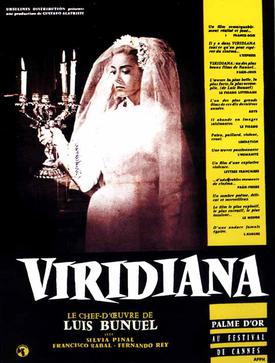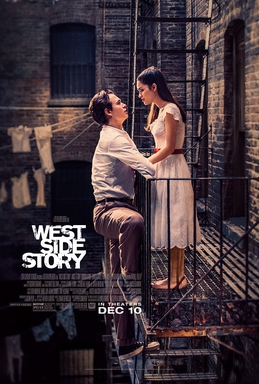A list of films produced in Spain in 1961 (see 1961 in film).
A list of films produced in Spain in 1961 (see 1961 in film).
| Title | Director | Cast | Genre | Notes | ||
|---|---|---|---|---|---|---|
| 1961 | ||||||
| Patricia mía | Enrique Carreras | Carlos Estrada, Susana Canales, Julio Peña, José Isbert | Romantic comedy | Co-production with Argentina | ||
| Viridiana | Luis Buñuel | Silvia Pinal, Fernando Rey, Francisco Rabal, Lola Gaos | Drama | Mexican production. Palme d'Or winner at the 1961 Cannes Film Festival; banned in Spain until 1977 | ||
| Ha llegado un ángel | Luis Lucia | Marisol, Isabel Garcés, Carlos Larrañaga | Drama, Musical | |||
| Plácido | Luis García Berlanga | José Luis López Vázquez, Cassen | Black comedy | Academy Award nominee and entered into the 1962 Cannes Film Festival | ||
| Vampiresas 1930 | Jesús Franco | Mikaela, Antonio Ozores, Yves Massard | Musical comedy | [1] | ||

Mario Fortino Alfonso Moreno Reyes, known by the stage name Cantinflas, was a Mexican comedian, actor, and filmmaker. He is considered to have been the most widely accomplished Mexican comedian and is well known throughout Latin America and Spain.

Leopoldo Antonio Carrillo was an American actor, vaudevillian, political cartoonist, and conservationist. He was notable for playing Pancho in the television series The Cisco Kid (1950–1956) and in several films.
The decade of the 1960s in film involved many significant films.

Sword-and-sandal, also known as peplum, is a subgenre of largely Italian-made historical, mythological, or biblical epics mostly set in the Greco-Roman antiquity or the Middle Ages. These films attempted to emulate the big-budget Hollywood historical epics of the time, such as Samson and Delilah (1949), Quo Vadis (1951), The Robe (1953), The Ten Commandments (1956), Ben-Hur (1959), Spartacus (1960), and Cleopatra (1963). These films dominated the Italian film industry from 1958 to 1965, eventually being replaced in 1965 by spaghetti Western and Eurospy films.

El Cid is a 1961 epic historical drama film directed by Anthony Mann and produced by Samuel Bronston. The film is loosely based on the life of the 11th-century Castilian knight and warlord Rodrigo Díaz de Vivar, called "El Cid". The film stars Charlton Heston in the title role and Sophia Loren as El Cid's wife Doña Jimena, spelled "Chimene" in the script and pronounced that way (shim-ain) in the film. The screenplay is credited to Fredric M. Frank, Philip Yordan and Ben Barzman, with uncredited contributions by Bernard Gordon.

Fernando Casado Arambillet, best known as Fernando Rey, was a Spanish film, theatre, and television actor, who worked in both Europe and the United States. A suave, international actor best known for his roles in the films of surrealist director Luis Buñuel and as the drug lord Alain Charnier in The French Connection (1971) and French Connection II (1975), he appeared in more than 150 films over half a century.

Francisco Rabal Valera, popularly known as Paco Rabal, was a Spanish actor. His career spanned more than 200 film and television roles, between 1942 and 2001. He received numerous accolades both in Spain and abroad, the Cannes Film Festival's Best Actor Award and the Goya Award for Best Actor.

The art of motion-picture making within Spain or by Spanish filmmakers abroad is collectively known as Spanish Cinema.

Viridiana is a 1961 Spanish-Mexican surrealist comedy-drama film directed by Luis Buñuel and produced by Gustavo Alatriste. It is loosely based on the 1895 novel Halma by Benito Pérez Galdós.

Lona Fay Spain was an American actress in motion pictures and television.

Ampudia is a municipality located in the province of Palencia, Castile and León, Spain. According to the 2004 census (INE), the municipality has a population of 677 inhabitants.

Pirates of Tortuga is a 1961 American swashbuckler film which invented an alternate history for the actual Welsh privateer Henry Morgan. It was released in October 1961 in the United States in CinemaScope.

María Concepción Bautista Fernández, better known as Conchita Bautista, is a Spanish singer and actress, best known for her participation in the Eurovision Song Contests of 1961 and 1965.
Events in the year 1961 in Spain.

Eduard Admetlla i Lázaro was a Spanish scuba diving pioneer, underwater cameraman and photographer, designer of underwater camera housings, designer of a self-contained underwater breathing apparatus (scuba), tester of scuba diving gear for the Nemrod trade mark, writer, director of TV series, explorer and broadcaster.

Gloria Evangelina Elizondo López-Llera was a Mexican actress and singer from the Golden Age of Mexican cinema. She starred in movies, television and theater. She was an accomplished artist having studied at the National School of Painting and had a degree in theology. She wrote two books and recorded numerous albums. In 2014, she received a Premios Arlequín for her contributions to Mexican culture.
Enrique Alarcón Sánchez-Manjavacas (1917–1995) was a Spanish film art director and set decorator. He worked on over two hundred films, mostly Spanish, but also in foreign films shot in Spain, such as King of Kings (1961).

West Side Story is a 2021 American musical romantic drama film directed and co-produced by Steven Spielberg from a screenplay by Tony Kushner. The second feature-length adaptation of the 1957 stage musical, which was itself inspired by William Shakespeare's play Romeo and Juliet, it stars Ansel Elgort and Rachel Zegler, the latter making her film debut, with Ariana DeBose, David Alvarez, Mike Faist, and Rita Moreno in supporting roles. Moreno, who starred in the 1961 film adaptation, also served as an executive producer alongside Kushner. The film features music composed by Leonard Bernstein with lyrics by Stephen Sondheim.